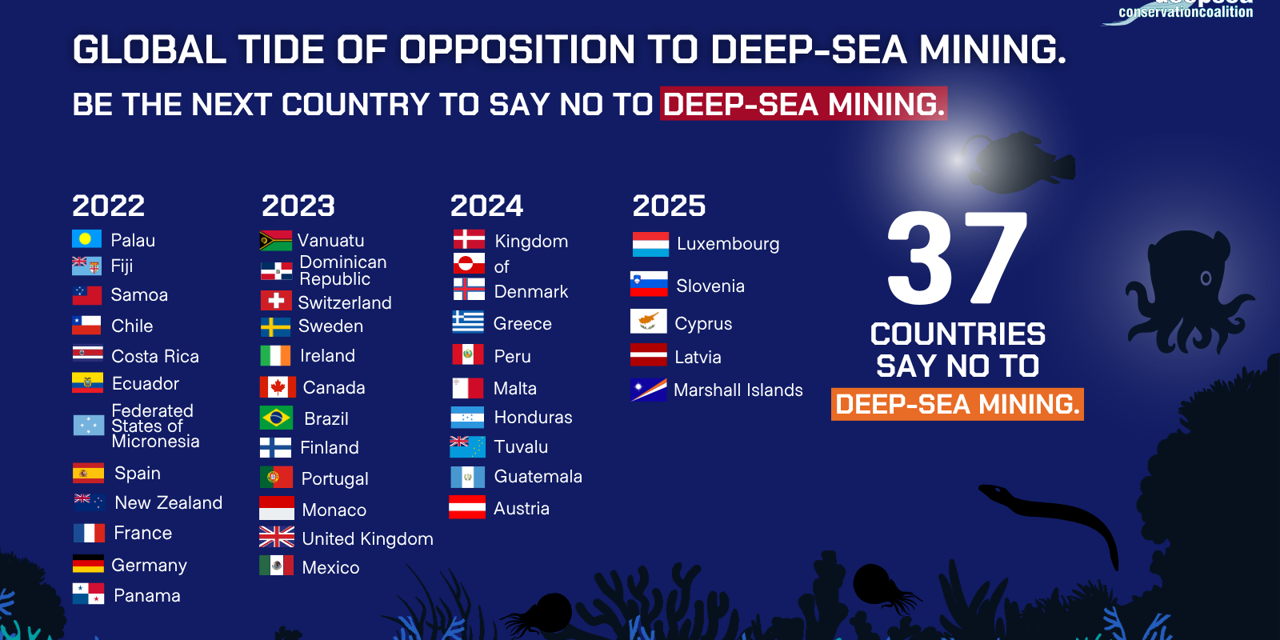ClientEarth Communications
31st May 2025


When we talk about the ‘deep sea’, it evokes images of a remote and untouched realm – a dark place at the bottom of the ocean full of creatures which we know little to nothing about. Due to its depth, it has been hard to reach - making it the last, most pristine ecosystem on Earth. Until now.
In its quest to secure mineral resources, the mining industry has set its eyes on a new frontier: the deep-sea. Yet, growing concerns are mounting over the risks to deep-sea ecosystems and habitats if mining companies proceed with mining the deep seabed for its mineral resources.
Initiating large-scale extraction activities in this pristine environment could have profound and lasting consequences for life on Earth whose scale is hard to predict.
Indeed, the science surrounding deep-sea mining remains largely uncharted, with many unknowns about its potentially disastrous impacts. Consequently, there is a growing call among scientists, NGOs, and governments for a global moratorium on deep-sea mining until comprehensive scientific research is conducted and consequent regulatory measures are established.
By “Deep-sea mining” we are referring to the industrial extraction of mineral resources from the ocean floor. These include polymetallic nodules, cobalt-rich crusts, and seafloor massive sulphides, which are rich in metals like cobalt, nickel, copper, and manganese. Modern technology relies on these key ingredients.
Mining operations propose to use massive underwater machinery to vacuum or cut into the seabed and bring mineral resources to the surface.
The deep sea is Earth’s largest, most pristine, and least understood ecosystem. It plays a crucial role in regulating the planet’s climate and is home to unique species, many of which are still undiscovered. If we disturb them, these ecosystems may never recover.
Since 1994, the International Seabed Authority (ISA) has the mandate to organize and control all mineral-resources-related activities in international waters for the benefit of humankind as a whole. They are the ones in charge of handing out deep-sea mining exploration contract and licences.
In the last few years, the ISA has been under a lot of pressure to make a final decision on the commercial extraction of minerals from the seabed, amidst calls for a moratorium.
The Deep Sea Conservation Coalition (DSCC) has identified some key concerns around deep-sea mining:
Irreversible biodiversity loss: Mining could destroy habitats before we even know what’s there. Scientists warn of permanent damage to fragile deep-sea ecosystems.
Carbon cycle disruption: The seabed, and the ocean, are the biggest carbon sinks on Earth. Disturbing it could release carbon dioxide, undermining climate goals.
Noise and light pollution: These interfere with marine life, including whales and migratory species.
Sediment plumes: Mining kicks up clouds of sediment that can smother deep-sea organisms and travel far beyond the mining site.
A moratorium is a temporary halt to ensure we don’t rush into destructive practices before understanding the consequences. 33 countries, scientists, civil society groups, Indigenous communities, and even major companies like Google, BMW, and Volvo have backed calls for a moratorium.
Here’s why a moratorium on deep-sea mining makes sense:
Scientific uncertainty: We lack sufficient knowledge of deep-sea ecosystems and the full impacts of mining. Imagine performing surgery in the dark, without knowing the patient’s anatomy or even what organs you're about to touch. You wouldn’t start cutting until you had scans, knowledge, and a plan. That counts for ecosystems too. The precautionary principle tells States not to allow any operations linked to potential environmental risks until we understand the full scientific scope of that risk.
Weak governance: There is no framework in place to respect the free, prior, informed consent of Indigenous peoples, nor to ensure consent from potentially affected communities. Public consultation mechanisms are not established either, nor any broad and informed public support for deep seabed mining. Finally, there is no transparent, accountable, inclusive and environmentally responsible decision-making and regulatory process.
Sustainable alternatives exist: By improving recycling and reducing consumption of minerals, and land-based mining reforms we can avoid mining the deep seabed.

Despite growing concern, some countries and companies are pushing to begin mining. In 2023, the Pacific island nation of Nauru triggered a legal loophole at the ISA to fast-track mining approval, sparking global debate.
More recently, President Trump signed an executive order to allow deep sea mining in international waters – trying to bypass the ISA. This move goes against customary international law and threatens the ocean and everything that depends on it.
But there is also good news! More and more countries, financial institutions and companies are joining the call for a global moratorium. To date, 33 countries—including France, Germany, and Chile—now support a permanent ban, a moratorium or a precautionary pause.
In the Blue Manifesto, roadmap to a healthy ocean by 2030, more than 140 NGOs have called for a global moratorium on deep-sea mining in international waters.
ClientEarth lawyer Arthur Meeus said:
“The deep sea is not a mine - it’s a living, breathing part of our planet. Let’s not destroy what we don’t yet understand. A moratorium on deep sea mining is not just wise policy - it’s a moral, legal and environmental imperative.”